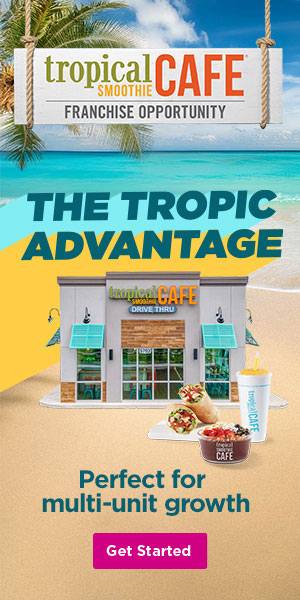Scaling the Mountain: Growing a Multi-Unit Operation into Double Digits...and Beyond
This is the last in a three-part series on tackling the challenges posed by growing your organization into a true multi-unit franchise company. So, for those of you who have taken the first steps into replicating your success and going from one unit to two, and then have made the commitment to build a fledgling organization by growing from two units to five...now, my suggestion is, "Why stop there?"
The franchise business model is designed for growing your organization and replicating your success. It has long been a vehicle to that allows you to invest in yourself! Keep it going!
A number of years ago I was with a small franchise organization with what I remember at the time was 96 units owned by 30-plus franchisees. Many of them were single-unit operators while a few had up to five units. I suggested to our president that we bring in a large multi-unit operator from another chain to speak to our franchisees about the journey that led him to that point. My hopes were that the existing franchisees would see that there was nothing to fear and find a desire to build upon the success they had already created.
After a bit of thought, the president suggested that we bring in an acquaintance of his who, at the time, owned 62 Taco Bell locations. This acquaintance has since gained world-wide fame with the book and movie "The Blind Side." That franchisee was Sean Tuohy. Sean stood up as the keynote speaker at our franchisee convention and basically said this (and I paraphrase as it has been 10 years or more since that speech): "I never set out with the goal of owning 62 stores, but when I finished one, I liked it so much that I went and built another one. I just never quit the process of building a new store. I would finish one and get started on the next."
He has gone on to build many more stores during the past ten years, and I imagine he has a few more still in him. But the message to me was a powerful one: "I found success and wanted to do it again." Becoming a large multi-unit franchisee starts with belief in yourself and a desire to invest in yourself.
As you grow into a large organization, standardized processes will become ever more important to your success. For practical advice in dealing with becoming a large organization, I turned to a colleague with longtime experience in operations, Tom Welter, vice president of franchise operations for J.D. Byrider. I told him what I was doing and asked him for input. Tom has more than 20 years of experience in franchise and corporate operations with several large organizations, including YUM Brands and 24-Hour Fitness. These are his thoughts:
In my 20 years of leading organizations with company and franchise operations, two fundamental truths I have gleaned are:
- Operations deteriorate much quicker than they are restored; and
- Operational decline quickly follows the lack of discipline surrounding the selection of personnel and their development.
In order for any organization to grow and continue to provide goods and services to consumers in a way that begets profit, business leaders need to look no further than the decisions they make regarding their human capital. Success in any operation always points to great leaders and their happy employees who are trained, understand their role within the organization, and who are not afraid to be held accountable for their work.
Your team thrives on challenge, and as you continue your growth, consider the following steps to smoothing out that transition from small to medium player within the market, or even from medium to larger regional operator:
Training and Development - I've always been a firm believer in education within any business environment and know that ongoing training is critical to the success and growth of the people who operate the business. Everyone in your operation should have a structured training plan prior to starting with your company. The plan serves as a guide to the teacher and student in order to fulfill the educational requirement necessary for that employee to become a fully functional member of the team. A majority of learning must be hands on, taking classroom theory and applying it.
Performance Management - Too often I hear from managers that it is difficult to either motivate employees or to exit them when they are not working out. When I dig in to the core issue, it usually is the lack of feedback and/or communication within the team that is inhibiting great performance and/or results. Remember, on the day we hired any employee, we felt they were the best candidate to help us move the business forward. What has changed? The cornerstone for performance management is clear expectations, and when employees perform to those standards, we should reward and recognize. These are the greatest opportunities to tell your employees how much you value them, and you should take the opportunity to thank them for their work. When they do not perform to the standards set forth, we need to ask the following questions:
- Is the employee capable of doing the work?
- Is the employee willing to do the work?
- If the employee is not willing, they are classified as a "won't" and should be quickly exited from the system. If an employee cannot perform the job duties, they are designated as a "can't." We train, coach, and develop can't employees. Employees who can't perform can be new to the industry or position or may be learning new skills and need our help. Employers should beware of long-term employees who cannot perform after extensive coaching and training. Long-term can't perform employees are won't perform employees.
Succession Planning - In any business, especially a growing enterprise, an often overlooked need is planning on who is going to lead the business and who you are going to develop for future growth. Looking at historical turnover rates in conjunction with future growth plans will tell you how many people you will need as well as when they need to be ready. Quarterly ratings of your current management team on core competency strengths and weaknesses will help you identify your rising stars and what training you need to provide to all. Many of your future leaders will need training in the competencies of time management, performance management, staffing and interviewing, and scheduling. Using a succession planning session once a quarter will help you identify your personnel needs as well as help you evaluate your team members on a consistent basis.
Execution of the Operational Plan - It is critical that your teams understand what is important to you and what you want them to accomplish. This comprehension should be threaded through your job descriptions, pay performance plans, weekly meetings, and daily operating scorecards. Every team member must understand the critical control points of:
- How you generate revenue.
- How you control your cost of goods.
How you manage labor will inevitably allow you to generate more profit and hold your team accountable to achieving your goals. Put your data to use for you and ensure you have a scorecard for everyone to review daily. I recommend a balanced scorecard that combines the financial, customer, and employee aspects of the business.
Support - In my 20 years of franchising, I have found that the franchisees that fall the furthest from the enterprise's operational standards and/or compliance standards are also the same franchisees that do not regard their franchisor as an operational partner. Chances are that as a franchisee, you are paying royalties for support, technical help, manuals, and training and site visits from a field operations consultant. The most successful franchisees have the best relations with the franchisor and partner with them to make the entire enterprise better. These franchisees understand that the relationship can never be an "us vs. them" proposition, and that by working together, it becomes a win/win for all.
As Tom suggests, your employees are your most important asset as you grow. You cannot underestimate the value they will bring to the organization if you invest in their success by providing them the training and tools necessary to succeed.
We wish each of you the greatest success in all you endeavor and leave you with our best advice - "Invest in yourself!"
Share this Feature
Recommended Reading:
| ADVERTISE | SPONSORED CONTENT |
FRANCHISE TOPICS
- Multi-Unit Franchising
- Get Started in Franchising
- Franchise Growth
- Franchise Operations
- Open New Units
- Franchise Leadership
- Franchise Marketing
- Technology
- Franchise Law
- Franchise Awards
- Franchise Rankings
- Franchise Trends
- Franchise Development
- Featured Franchise Stories
| ADVERTISE | SPONSORED CONTENT |

$200,000
$50,000





 The multi-unit franchise opportunities listed above are not related to or endorsed by Multi-Unit Franchisee or Franchise Update Media Group. We are not engaged in, supporting, or endorsing any specific franchise, business opportunity, company or individual. No statement in this site is to be construed as a recommendation. We encourage prospective franchise buyers to perform extensive due diligence when considering a franchise opportunity.
The multi-unit franchise opportunities listed above are not related to or endorsed by Multi-Unit Franchisee or Franchise Update Media Group. We are not engaged in, supporting, or endorsing any specific franchise, business opportunity, company or individual. No statement in this site is to be construed as a recommendation. We encourage prospective franchise buyers to perform extensive due diligence when considering a franchise opportunity.